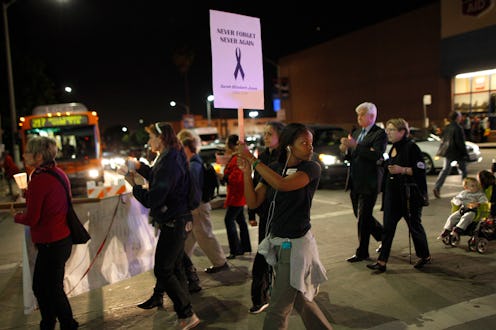Entertainment
A Dramtatic Turn In the Sarah Jones Case
On Feb. 20, 2014, second camera assistant Sarah Jones was struck by a train and killed while shooting the film Midnight Rider in Wayne County, Georgia. It was an event that rocked the large day-to-day, behind-the-scenes part of the Hollywood engine — the part of the iceberg largely unseen but nonetheless crucially important. Now Wayne Superior Court has charged a number of Midnight Rider 's filmmakers with Involuntary Manslaughter and Criminal Trespassing.
When we say Jones' death touched and shook Hollywood, we mean it: The wake of the tragedy invited not only tributes for the assistant, but conversations about film safety as well. And with Wayne Superior Court's charges, those conversations will no doubt continue in the time to come.
Following her passing, industry friends jumpstarted Slates For Sarah, in which crews from various projects — from Girls to The Vampire Diaries — paid tribute to Jones by adding her name to their slates. William Hurt, who was starring in the film and was on the train trestle the night she was killed, quit the production. Jones' name also landed a mention during the Oscars In Memoriam, a testament in itself to the weight of the incident.
Jones' death very quickly became a call to action, bringing issues of safety in Hollywood to the forefront. Just this week a PSA entitled "We Are Sarah Jones" was released, highlighting the importance of safety for crews.
Those charged Thursday were Randall Miller (director), Jody Savin (producer), and Jay Sedrish (unit production manager and executive producer). According to Deadline, "a manslaughter conviction would carry a sentence of ten years in prison. Criminal trespass is a misdemeanor and carries potential sentence of 12 months." Jones' parents, Richard and Elizabeth Jones, have released a statement in response to the charges:
Elizabeth and I are comfortable that the authorities were both careful and meticulous in investigating and bringing charges related to the incident that took our daughter’s life. We must allow the criminal justice process to proceed unhindered. Our mission remains the same: to ensure safety on all film sets. Safety for Sarah.
As Nikki Finke wrote July 3, criminal charges in this case could be a "wake-up call" for the filmmaking industry:
I’m certain that only criminal charges and big bucks in damages will get Hollywood’s attention to change the flagrant way that safety codes are violated on location.[...] Many have said Jones’ death was a direct result of the indie movie chasing state tax incentives – a result that can have disastrous safety consequences, according to producers, risk managers and insurance brokers who spoke at the recent Producers Guild Of America ‘Produced By’ panel on industry safety. Yes, there’s no doubt that Jones’ death shook the industry like no other accident since the 1982 Twilight Zone disaster.
Seems their eyes are wide open now.
